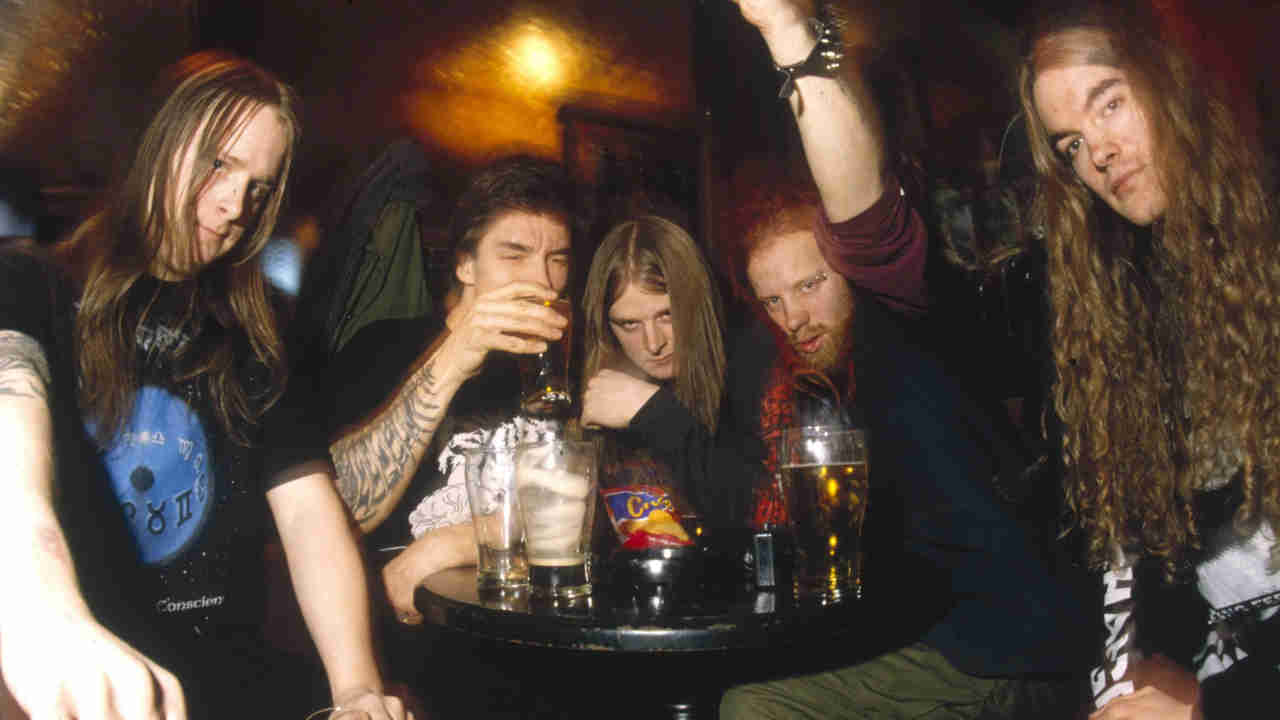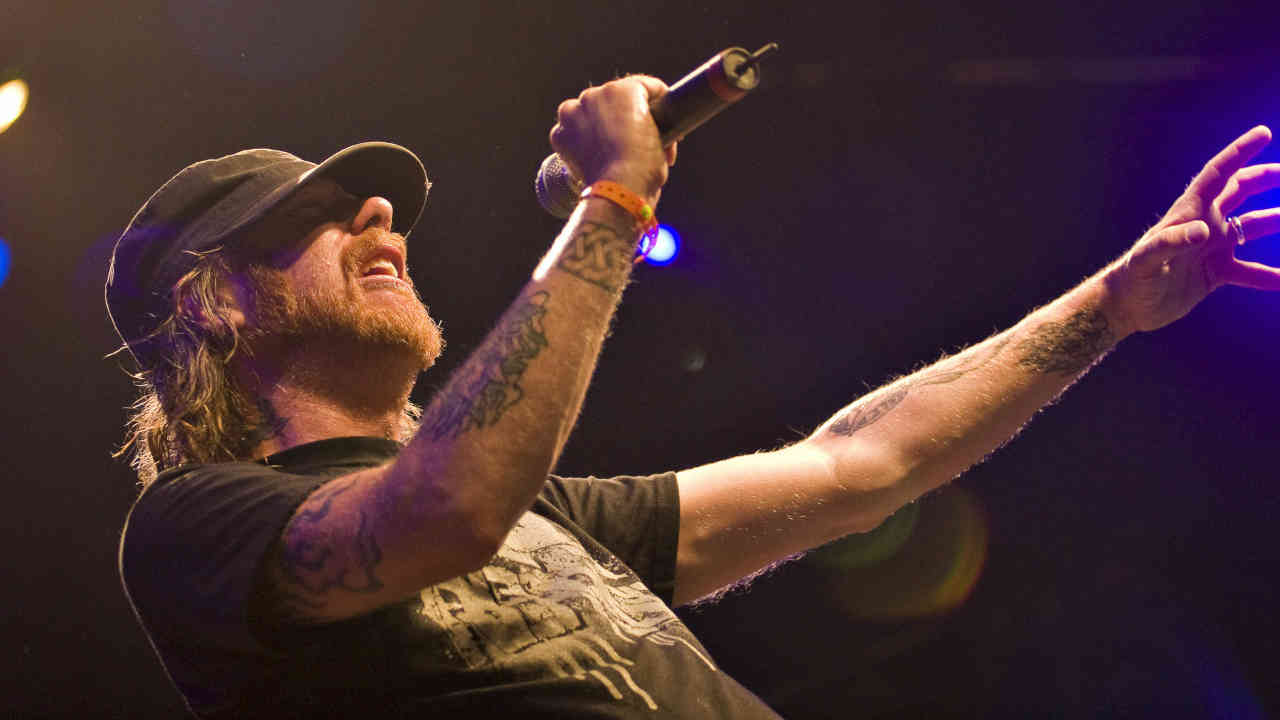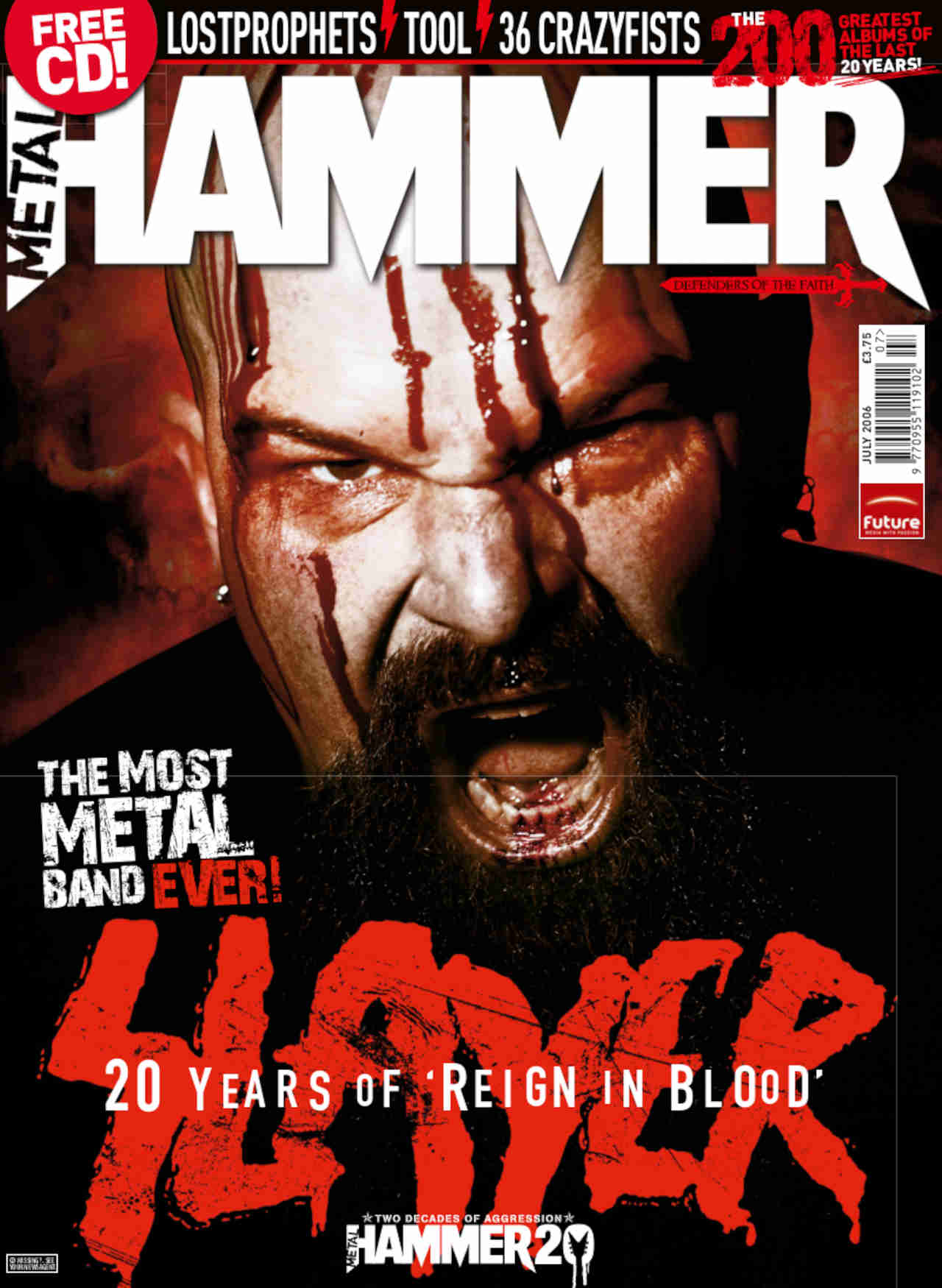
At The Gates’ fourth album, 1995’s Slaughter Of The Soul, was one of the most influential death metal albums of that entire decade, shaping the ‘Gothenburg Sound’ and influencing a generation of melodeath bands that followed. In 2006, singer Tomas Linberg looked back on a 90s landmark.

As the 90s headed towards its mid-point, death metal was in trouble. The scene that had pushed back the boundaries of brutality was becoming stale. While its founding fathers were still around, they were either treading water (Obituary, Morbid Angel) or heading off in a completely different direction (Death).
But death metal’s epicentre was starting to shift. Where Florida had once been the home of all things malevolent, the spotlight had begun to swing towards Sweden – and Gothenburg in particular, where a inter-connected group of bands were putting a Scandinavian spin on death metal. And at their forefront was At The Gates, who would drag the scene into the modern era, helping take a new strain of melodic death subsequently dubbed the ‘Gothenburg Sound’ to the world
Formed in 1990, the band matched brutality with melody, intricate guitar harmonies with feral and ferocious riffs. They kicked into gear with 1991’s Gardens Of Grief EP followed 12 months later by adebut album The Red In The Sky Is Ours. Two more records documented the band’s steady climb out of the underground – 1993’s ‘With Fear I Kiss The Burning Darkness’ and ‘Terminal Spirit Disease’ the following year.
But everything would finally fall into place with the fourth in this incredible run of records: 1995’s Slaughter Of The Soul. Here was a record that was important to death metal future as Death’s Scream Blood Gore had been eight years earlier.
“Like every band, when we made any album we liked to think it was special,” recalls At The Gates frontman Tomas Lindberg. “But over the years Slaughter Of The Soul has gotten a life of its own. That’s probably not the case, as once a record gets that amount of attention, a lot of musicians feel they need to be seen as being into it.”

What was the secret? Simple. They set out to make a record as good as Exodus’s Bonded By Blood or Slayer’s Reign In Blood.
“We never expected to get even close, but thought that if this was our aim, then we might get about halfway,” says Tomas. “There were loads of death metal bands around at the same time, but they were all happy to make mediocre records. We never saw this as an option. At The Gates wanted to test ourselves against the giants.”

For the singer, the birth of Slaughter Of The Soul lies with its predecessor, Terminal Spirit Disease.
“If you listen to our first two albums, the style was very technical and complex,” he says. “The musicianship sometimes got in the way. So, when it came to Terminal… we felt it was time to progress – and by that I mean to become simpler and more straightforward. Now, to some people, this might seem like going backwards, but for us, it was a case of not cluttering up the music with a lot of unnecessary baggage. We wanted to be more direct, to be more brutal. Terminal Spirit Disease started the process. It was the embryo from which we gave birth to Slaughter Of The Soul.”
Terminal Spirit Disease was to be At The Gates’ final release for Peaceville, before their switch to another UK label, Earache. Lindberg sees this as being a major part of the way Slaughter Of The Soul developed.
“I’m not gonna knock Peaceville, but they didn’t have the budget available to allow us to develop,” he says. “The final straw came when we were stranded in England for about a week after a tour, because the label didn’t have the money to get us home. We were very angry, and I think you can hear this in the lyrics I wrote for Slaughter Of The Soul. When Earache came along, it was like being saved. They already had a good reputation for signing classic death metal bands, so we felt right at home.”
Crucially, Earache took considerable pressure off the band, giving them a lot more freedom over the way the fearsome fivesome recorded the new album – and how long they took in doing so,
“In the past we’d been used to getting two or, perhaps, three weeks in total to get a record done. Now, we had double that. It helped that we’d carefully prepared the songs in advance. A lot of time had gone into getting the material exactly the way it should be – there wasn’t a lot of pre-production, more a case of working things out in rehearsals.”
At The Gates chose to work with co-producer Fredrik Nordstrom, and to record at his Studio Fredman set-up in Gothenburg. These days, both Nordstrom is known for his work with bands like In Flames, Opeth, Dimmu Borgir and Arch Enemy. But in 1995, it was a different matter.
“Hardly anyone knew who Fredrik was! I suppose this album played a key role in getting him noticed. But we got on well with Fredrik, and it suited us.”
However, At The Gates did insist that Nordstrom buy a new 24-track mixing desk especially for recording, something that did cause slight friction during the recording process.
“As a band, we knew that this was a watershed album for us, and that a lot was riding on it financially. Fredrik had spent a lot of money on the new desk, just to please us. This did lead to a few arguments. Nothing major, but there was the odd occasion when the pressure got to us all. Overall, though, our relationship with Fredrik was good, and he did a great job in helping us to make the record as good as it could possibly be.”
With a stripped down new approach, At The Gates knew that the guitar sound would be the epicentre of what they were trying to achieve. To this end, a lot seems to have been sacrificed to ensure that guitarists Martin Larsson and Anders Bjorler got all the time they needed to get things right.
“I think I’m right in saying that we spent about three weeks getting the rhythm guitar sounding the way it should,” explains the singer. “That might seem crazy, but we all knew how much the record would be judged on the guitars. I did all of my vocals in just three days. It was pressurised, but worth it.
“Lyrically, we also matched the very basic approach of the music. There was something a lot more hardcore about what I wrote as compared to before. All mention of dragons and Vikings went out. I concentrated on real life and social issues. It was more down to earth, and less mythical.”
The band also called on one local musician to guest on the album.
“We were all big fans of Mercyful Fate and King Diamond,” says Lindberg. “When we found that Andy LaRocque, King Diamond’s guitarist, worked in a local music shop, we had to have him on the record. Fredrik also worked there occasionally, so he got Andy down to the studio. He did a brilliant solo on ‘Cold’. We never thought about getting anyone else in at all. The five of us were so locked into making the record that nothing outside seemed to exist.”
If everything went smoothly in the studio, then the band were pleasantly surprised about how excited Earache were – not only by the standard of the record, but also at the high level of the sound quality.
“They were really into it. In fact, I believe that they changed virtually none of the levels in the mastering process. The only disagreement we had with them was over the cover artwork. We got in a guy called Kristian Wahlin [who went on to join Lindberg in his later band The Great Deceiver] to do this, and he went on to work as an artist with bands like Therion and Dark Tranquillity. We’d wanted to work with him for a while. Kristian wanted to take his time over things, but Earache were pushing us. So, there was a bit of a battle. But, in the end we won, and Kristian got the time he needed.”
Slaughter Of The Soul was released in 1995, and quickly captured the imagination of existing death metal fans and those who were looking for a new strain of intensity.
“There was a huge buzz about the album. It sold really well – at least when compared to what we’d done before. And things were going so well. We toured Britain, Europe and America, and were set up for the next record, when…” the band were as stunned as the fans when Anders Bjorler announced he was quitting.
“Anders couldn’t deal with the pressure, it was as simple as that. We tried to persuade him to change his mind, but everything just got on top of him. The success of the album had lifted us to a new level, but it also brought its own problems. Earache were really nagging us to go back into the studio, and Anders cracked. With hindsight, perhaps we should have looked to replace him and carry on, but we were all still very young, and weren’t in the mood to do that. As a result, the band fell apart.”
Amazingly, less than a year after the release of this definitive album – and with their status rising meteorically towards that of their heroes, At The Gates stopped. No conflict, no arguments. They just pulled the plug.
“I guess in one way I regret that decision, because it can be said we were on the way to even bigger things. But perhaps Slaughter Of The Soul was always gonna be our high point – and how many bands do you know who should have quit after their finest record, yet insist on going on, way beyond their sell-by date? We stopped on an amazing high.”
The former members of At The Gates went on to form several other notable bands, including The Haunted (feature guitarist Anders Björler, his twin brother, bassist Jonas Björler, and drummer Adrian Erlandsson) and The Crown, The Great Deceiver, Lock Up and Nightrage (all Tomas Lindberg). But Slaughter Of The Soul ’s impact remained huge, influencing everyone from Killswitch Engage and Trivium to The Black Dahlia Murder.
“Is it a landmark record? I don’t know any more. That’s the truth,” says Lindberg, who reunited with his At The Gates bandmates in 2007. “If you ask me whether I’m proud of what we did, then of course I am. If you want to know what I think about the ways others praise the album, that’s tougher. All five of us are amazed that it’s constantly cited as important in the way death metal has developed. Did we give the genre a shot in the arm? Wow! That’s crazy. Are we really up there with bands like Exodus and Slayer, whom we regard as heroes? That’s not for me to say.”
Originally published in Metal Hammer issue 154, June 2006. Updated in October 2024







